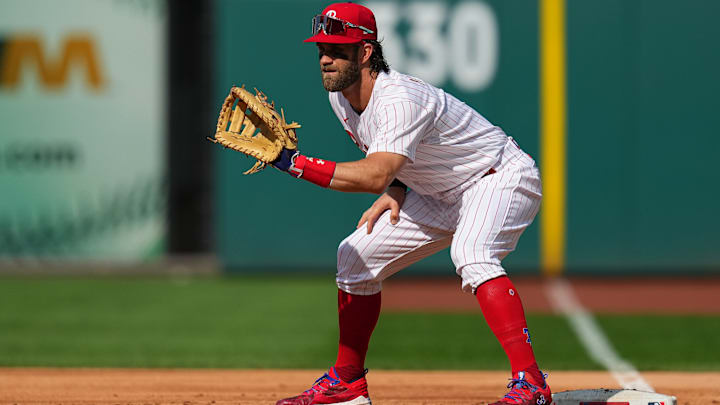In recent weeks, the Philadelphia Phillies have deployed superstar Bryce Harper at first base in an effort to ease him slowly back into on-field action following his offseason Tommy John surgery. In effect, the Phillies were then able to move Kyle Schwarber off the field and into the DH spot so that they could insert a stronger, defensive outfielder to bolster the outfield defence of the ballclub at the same time.
Prior to this year, Harper has mainly been an outfielder throughout his career. As a result, he may be inclined to return to his original playing position once he has fully recovered and deemed healthy, but in the long run, keeping him at first base may be the best move going forward for both the Phillies and Harper himself.
Why the Phillies should keep Bryce Harper at first base long-term
First of all, keeping Harper at first base will help preserve his health and well-being over a longer period of time as he heads toward the latter part of his career. The wear-and-tear from the demands of manning an outfield position, especially for someone coming off a major surgical procedure such as Tommy John surgery, could essentially have detrimental effects on a recovering player looking to regain his prior form over time. Also, his frequency of injuries has increased dramatically in the past couple of years, with multiple ailments occurring in his back, shoulder, wrist, hand, arm, foot and elbow. In addition, Harper has already played close to 1300 games in the outfield for his career, along with being on the wrong side of 30 currently, so it is expected he will eventually make the transition to first base or DH eventually, so just doing it a little earlier wouldn’t change things too much.
Secondly, Harper statistically hasn’t been a plus-defender in the outfield for much of his career, as other than his 14 DRS from his rookie season in 2012 and 11 DRS from his 2019 season, his defence has generally been just average. He does possess a slightly above average power arm, as he has thrown out 78 baserunners in his 11 seasons playing in the outfield. But with his TJ surgery occurring on his vital throwing arm, his most valuable asset as an outfielder could potentially be affected already.
Thirdly, looking at the Phillies MLB Pipeline Top Prospects list, they actually have many up and coming outfield prospects on the horizon, including potentially ‘five-tool’ phenom Justin Crawford and one that has already impressed since his MLB debut last month in Johan Rojas. However, there is not a single first baseman prospect to be found among their top 30, unless they begin to reacclimatize some of their outfield prospects with the new position over time. At the same time, with Harper currently in just his fifth year of his 13-year contract with the Phillies and hopefully will be with the ballclub for the remainder of his contract, it just makes the most sense to keep him at first base to help cover for the lack of depth at the position, along with keeping the outfield positions open to fit in their strong outfield prospects and allow them to prosper as a result.
In the end, it will probably come down to what Harper decides to do with his career heading forward, but it would be to both the Phillies and Harper’s best interest if Harper can stay at first base from here on out. That way, it would ensure that he could be a healthy and productive player heading into his late 30s, and at the same time, allow the Phillies to put out their best defensive lineup on the field to give the ballclub the best chance of winning at all times, whether it be now or the foreseeable future.
